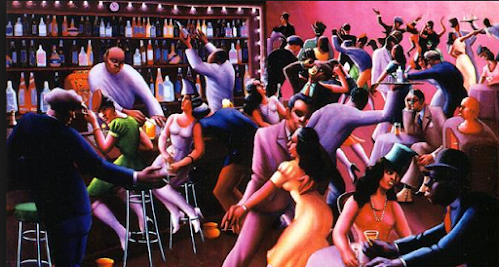(Drivebycuriosity) - I like to read history books. There is so much to learn from them. I just finished "Only Yesterday: An informal history of the 1920s" by Frederick Lewis Allen ( amazon). The 1920s were fascinating because the period had an explosive growth of technology, economy & culture but ended with a collapse & an economic depression.
The book was published in 1931 by an eye witness. The author was neither a historical scholar nor an economist but Allan was as the editor of the magazine "Harpers"and had enough insights into what was going on then. He describes the developments with humor and spiced his report with a lot of anecdotes.
There was a technological revolution which changed the whole world: "In 1919 there had been 6,771,000 passenger cars in service in the US;
by 1929 there were no less than 23,121,000." The sales of radios jumped
from $60,000,000 in 1922 to $842,548,000 - an increase of 1,400%. A lot of other things, including telephones, refrigerators, electric washing-machines, cosmetics, rayon (a synthetic fiber used for stockings & lingery instead of silk & wool) and more also became much cheaper and available to the masses. This led to an unprecedented industrial growth, the Coolidge Prosperity (named after President Calving Coolidge who was in office August 2, 1923 – March 4, 1929 ). Between 1922 and 1927, the purchasing power of American wages increased at the rate of more than 2% annually.
The boom was fueled by 2 new stimulants: Buying on credit (installment buying)
and massive gains on the stock market. "When stocks were skyrocketing in 1928
and 1929 it is probable that hundreds of thousands of people were buying
goods with money represented, essentially, a gamble on the business
profits of the nineteen-thirties. The
confidence was strengthened by an almost superstitious belief that
the ruling Republican Adminisrtation was the invincible ally."
Shocked Eyes
The economic boom let to significant changes in lifestyle and culture.
Thanks to the rise of radio, people at home could follow the news, watch
baseball games and listen to concerts at home. There also was a steep rise of motion pictures and people flocked to the movie theaters. The boom also seemed to encourage a general
zest for life and caused a "
revolution in manners and morals": "A new generation of women, called the ´flappers`, wore thin dresses, short -sleeved and occasionally
sleeveless; some rolled their stockings below their knees, revealing ´to
the shocked eyes` fleeting glance of shin-bones and knee-cap; and many
of them were visibly using cosmetics".
Allen describes the prohibition and the controverse between the "dry", who wanted to forbid producing & drinking alcohol and the
"dry", who opposed prohibition. "The world war accustomed the country to drastic legislation conferring new and wide
powers upon the Federal Government. It necessitated the saving of food
and thus commended prohibition to the patriotic as a grain-saving
measure. It turned public opinion against everything German - and many
of the big brewers and distillers were of German origin".
But
it the ban on alcohol couldn´t be a enforced totally, of course. There were legions of
smugglers and speakeasies (disguised bars & pubs), neglected by a corrupt police force. Alcohol distribution brought huge profits for organized
crime and fueled the rise of the Mafia, mobster bosses like the legendary Al Capone build an empire on
alcohol.
In the years 1928 & 1929 the boom led to an euphoria on the stock market - the Great Bull Market. The value of many leading stocks tripled in just 18 months. Many stock purchases were financed with loans (on margin) which got cancelled as the market turned.
The book is an entertaining read. It also may advise politicians and other authorities to avoid the plenty of mistakes which were made then.

No comments:
Post a Comment